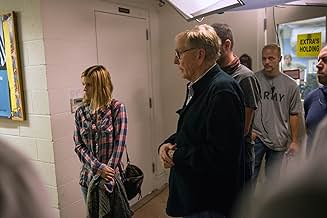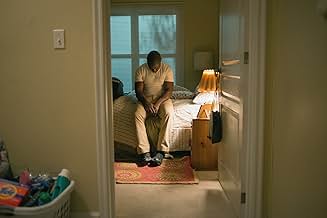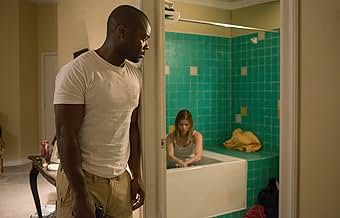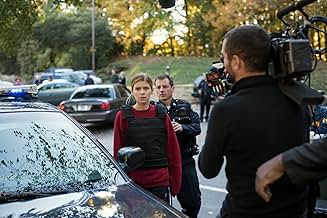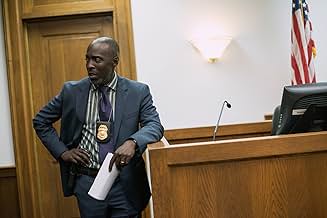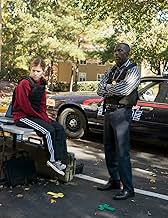PUNTUACIÓN EN IMDb
5,4/10
7,4 mil
TU PUNTUACIÓN
Añade un argumento en tu idiomaA single mother struggling with drug addiction is taken hostage in her own apartment by a man on the run who has broken out of jail and murdered the judge assigned to his case.A single mother struggling with drug addiction is taken hostage in her own apartment by a man on the run who has broken out of jail and murdered the judge assigned to his case.A single mother struggling with drug addiction is taken hostage in her own apartment by a man on the run who has broken out of jail and murdered the judge assigned to his case.
- Premios
- 3 nominaciones en total
Michael Kenneth Williams
- Lt. John Chestnut
- (as Michael K. Williams)
Leon Pridgen
- Squad Room Officer
- (as J. Leon Pridgen II)
Argumento
¿Sabías que...?
- CuriosidadesThe blue truck that Brian Nichols stole in the movie was the real car that the real Brian actually stole.
- Banda sonoraSinkin Drinkin Fits
Music & Lyrics by Jessy Moss (as Jessica T Moss) and Walton Gagel
(c) 2005 Jessy Moss Music (ASCAP) and Production Club Music (ASCAP)
Courtesy of Jessica Moss Music
Reseña destacada
I've often said that every movie has a point of view and, whether you agree with that perspective or not, every film should be judged on how well it presents its story. It's difficult, therefore, for audience members to take a movie seriously when it's obviously "reaching" in its efforts to back up its point of view, and then sends mixed messages along the way. The drama "Captive" (PG-13, 1:37) has problems that should be obvious to the average Movie Fan before he or she even enters the theater. First of all, the simple but vague title has been used previously by at least six other movies, with greatly varied plots. (How can you hope to distinguish your movie and its supposedly unique message by choosing an oft-used and fairly meaningless title?) Secondly, when basing a movie on a true story which assumes an unprovable connection between events, you've chosen a story which will be difficult to make into a compelling feature film. (More on that later.) Thirdly, when your movie obviously wants the audience to think one way about certain characters and incidents, but then shows the audience just the opposite, it's tough to get any clear message across. (Another point to be expanded upon later in this review.) This film is based on the book "Unlikely Angel" written by Ashley Smith about the seven hours that she was held captive by an escaped prisoner. Brian Nichols (David Oyelowo) grew up in a middle-class family, had a God-fearing mother and attended college. He played college football and held down a couple decent jobs, but something went wrong somewhere along the way. He's about to go on trial for rape when he brutally beats a female guard and steals her gun and police radio. While escaping from Atlanta's Fulton County Courthouse and later trying to avoid detection, Nichols kills four people. Looking for a place to lay low for a while, he comes upon Ashley Smith (Kate Mara) smoking a cigarette outside her suburban Atlanta apartment. At gunpoint, he forces her back inside her otherwise empty residence.
Ashley Smith was a young woman who hadn't killed people, but had messed up her life in other ways. She was addicted to meth, a habit which had cost her her husband, who had been stabbed to death by a drug dealer, and her daughter, Paige (Elle Graham), who the courts had taken away from Smith and who was living with Smith's Aunt Kim (Mimi Rogers). Ashley obviously loves her daughter very much and is trying to get her life together so Paige can return to living with her, but she's having trouble staying on the straight and narrow. We see Ashley at a Celebrate Recovery meeting (an addiction rehabilitation program sponsored by evangelical Christian churches around the country), but it's mentioned that this was her first meeting in a while. One of the group's leaders tries to give Ashley a copy of Pastor Rick Warren's best-seller "A Purpose-Driven Life", but Ashley throws the book in the trash. (The woman retrieves the book and drops it off at the restaurant where Ashley works as a waitress.) Ashley continues doing meth and is high as she's unpacking her new apartment on the night that Nichols abducts her.
Over the next seven hours a strange bond develops between Nichols and Smith inside that apartment. She's initially as frightened as anyone in that situation would be, but she stays calm enough that Nichols doesn't perceive her as a threat. At first, he ties her up, but eventually he allows her to move about the apartment freely. He learns that she has drugs in the house and makes her share. Later, he forces her to help him ditch his truck. In spite of all this, as morning dawns, she makes him breakfast and the two of them talk. They commiserate over how they both feel misunderstood. When Nichols sees Smith idly thumbing through Warren's book, he asks her to read some of it to him. This happens several times during Smith's ordeal. At first, Nichols dismisses Warren's words as "a bunch of church crap", but, as the night wears on, he seems oddly calmed and even challenged by the short passages Smith reads aloud.
I won't take issue with the possible role of a higher power in this story, but rather with the way it's portrayed. It'll be clear to most discerning Movie Fans that Warren's book had little, if anything, to do with the way this story is resolved. Smith could have accomplished the same thing by reading to Nichols from her diary. It was her attitude and her approach that calmed Nichols down. Also, are we to overlook Nichols' crimes because they're shown with no blood and aren't repeated later in Smith's apartment? This is a decent home invasion story, but any suggestion that we should sympathize with a man who was unrepentant after murdering four innocent people is offensive, and the idea that a non-Christian drug addict diffused a potentially deadly situation by reading a few sentences from a book that happens to mention God is just silly. There can be little doubt that this experience changed Smith's life (how could it not?), but surviving such an experience would've changed the life of anyone regardless of her beliefs.
The main thing that makes "Captive" any better than an After School Special are solid performances by leads Oyelowo and Mara, as well as Rogers and Michael K. Williams (as the lead detective pursuing Nichols). Still, all these performances do is put a nice coat of gloss on a story that makes questionable assumptions, sends mixed messages and means little except to those directly involved. "C-"
Ashley Smith was a young woman who hadn't killed people, but had messed up her life in other ways. She was addicted to meth, a habit which had cost her her husband, who had been stabbed to death by a drug dealer, and her daughter, Paige (Elle Graham), who the courts had taken away from Smith and who was living with Smith's Aunt Kim (Mimi Rogers). Ashley obviously loves her daughter very much and is trying to get her life together so Paige can return to living with her, but she's having trouble staying on the straight and narrow. We see Ashley at a Celebrate Recovery meeting (an addiction rehabilitation program sponsored by evangelical Christian churches around the country), but it's mentioned that this was her first meeting in a while. One of the group's leaders tries to give Ashley a copy of Pastor Rick Warren's best-seller "A Purpose-Driven Life", but Ashley throws the book in the trash. (The woman retrieves the book and drops it off at the restaurant where Ashley works as a waitress.) Ashley continues doing meth and is high as she's unpacking her new apartment on the night that Nichols abducts her.
Over the next seven hours a strange bond develops between Nichols and Smith inside that apartment. She's initially as frightened as anyone in that situation would be, but she stays calm enough that Nichols doesn't perceive her as a threat. At first, he ties her up, but eventually he allows her to move about the apartment freely. He learns that she has drugs in the house and makes her share. Later, he forces her to help him ditch his truck. In spite of all this, as morning dawns, she makes him breakfast and the two of them talk. They commiserate over how they both feel misunderstood. When Nichols sees Smith idly thumbing through Warren's book, he asks her to read some of it to him. This happens several times during Smith's ordeal. At first, Nichols dismisses Warren's words as "a bunch of church crap", but, as the night wears on, he seems oddly calmed and even challenged by the short passages Smith reads aloud.
I won't take issue with the possible role of a higher power in this story, but rather with the way it's portrayed. It'll be clear to most discerning Movie Fans that Warren's book had little, if anything, to do with the way this story is resolved. Smith could have accomplished the same thing by reading to Nichols from her diary. It was her attitude and her approach that calmed Nichols down. Also, are we to overlook Nichols' crimes because they're shown with no blood and aren't repeated later in Smith's apartment? This is a decent home invasion story, but any suggestion that we should sympathize with a man who was unrepentant after murdering four innocent people is offensive, and the idea that a non-Christian drug addict diffused a potentially deadly situation by reading a few sentences from a book that happens to mention God is just silly. There can be little doubt that this experience changed Smith's life (how could it not?), but surviving such an experience would've changed the life of anyone regardless of her beliefs.
The main thing that makes "Captive" any better than an After School Special are solid performances by leads Oyelowo and Mara, as well as Rogers and Michael K. Williams (as the lead detective pursuing Nichols). Still, all these performances do is put a nice coat of gloss on a story that makes questionable assumptions, sends mixed messages and means little except to those directly involved. "C-"
- CleveMan66
- 19 sept 2015
- Enlace permanente
Selecciones populares
Inicia sesión para calificar y añadir a tu lista para recibir recomendaciones personalizadas
- How long is Captive?Con tecnología de Alexa
Detalles
Taquilla
- Presupuesto
- 2.000.000 US$ (estimación)
- Recaudación en Estados Unidos y Canadá
- 2.583.301 US$
- Fin de semana de estreno en EE. UU. y Canadá
- 1.393.243 US$
- 20 sept 2015
- Recaudación en todo el mundo
- 2.801.508 US$
- Duración1 hora 37 minutos
- Color
- Mezcla de sonido
- Relación de aspecto
- 1.85 : 1
Contribuir a esta página
Sugerir un cambio o añadir el contenido que falta

Principal laguna de datos
By what name was Cautivo (2015) officially released in India in English?
Responde






